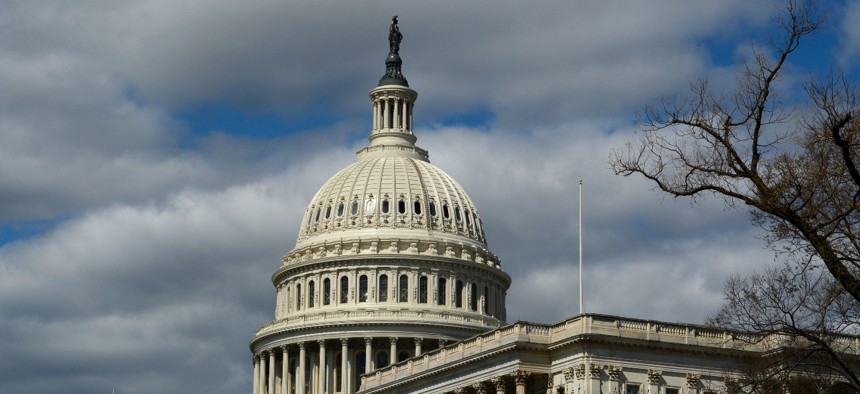
The 2022 fiscal year ends on Sept. 30, however the administration is confident Congress will come to a bipartisan budget agreement. Robert Alexander/Getty Images
The Biden Administration Asks Congress for a Continuing Resolution With $47 Billion for Ukraine, COVID, Monkeypox and Natural Disasters
The request is a stopgap measure, as White House officials say they believe a deal on the fiscal 2023 budget is close.
While Congress and the Biden administration are still hammering out a budget deal for the upcoming fiscal year, the Biden administration is asking for a short-term funding measure with specific funding, totaling $47.1 billion, to support Ukraine, respond to the COVID-19 pandemic and monkeypox spread as well as help areas impacted by natural disasters.
The White House said on Friday that a continuing resolution will be needed as the fiscal year ends on Sept. 30, however the administration is confident Congress will come to a bipartisan agreement. If no agreement is reached by the end of the fiscal year, then a government shutdown will begin just over a month from the midterm elections.
“Today, as part of our prudent planning for the end of the fiscal year, we are providing technical
assistance to Congress on a short-term CR,” which “provides guidance to lawmakers on funding and legislative adjustments that are necessary to avoid disruptions to a range of important public services,” wrote Shalanda Young, director of the Office of Management and Budget, in a blog post. “As part of the CR, we are also calling on Congress to provide funding to meet four critical needs: support for Ukraine, COVID-19, monkeypox, and natural disaster recovery.”
Specifically, the administration is requesting:
- $13.7 billion for security and economic assistance for Ukraine as well as to address the impact of Russian President Putin’s “war has had on domestic energy supply and reduce energy costs in the future,” said a factsheet.
- $22.4 billion for the short-term COVID needs, such as testing, accelerating the research and development of new vaccines and treatments, preparing for future variants and supporting the worldwide response to the pandemic.
- $4.5 billion for monkeypox vaccines, testing and treatments as well as efforts to help the global response to the outbreak that started in May.
- $6.5 billion to help states, Tribes, and Territories recover from natural disasters and extreme weather events.
The Biden administration has been requesting additional funding COVID response for months, but with no success. Due to the lack of funding, the administration has had to cut back on providing free tests through COVIDtests.gov and replenishing the Strategic National Stockpile with tests, an administration official said on a background briefing call Friday.
Young said that as per usual, the administration knows that Congress will be considering additional legislation for the CR. An administration official confirmed on the call that the request covers the last three months of the year, “however the duration of the CR itself is up to Congress.”
In response to a question about Republican lawmakers’ previous demands for off-sets with COVID funding, an administration official said, emergency funding requests, which this is, have been provided under Republican and Democratically controlled Congress and administrations without off-sets. “We believe Congress should provide it that way again,” said the official. “In the past we’ve been open to having conversations about off-sets in particular pieces.” The official emphasized the urgency of this funding for the American people.
“While a shutdown isn’t likely, Republicans and even some progressives have suggested that approving a bipartisan stopgap won’t be easy if it includes certain energy permitting provisions meant to button up the climate portions of Democrats’ signature party-line domestic policy bill,” Politico reported last week. With the upcoming midterm elections, “Republicans are expected to regain House control, and while conservative demands to return to Trump-era spending levels are implausible, the party might decide it’s worth waiting until it has more leverage to negotiate federal funding — while Democrats are looking for a deal while they know they still have majorities in both chambers, however slim.”
NEXT STORY: VA to Offer Abortions in Limited Cases







